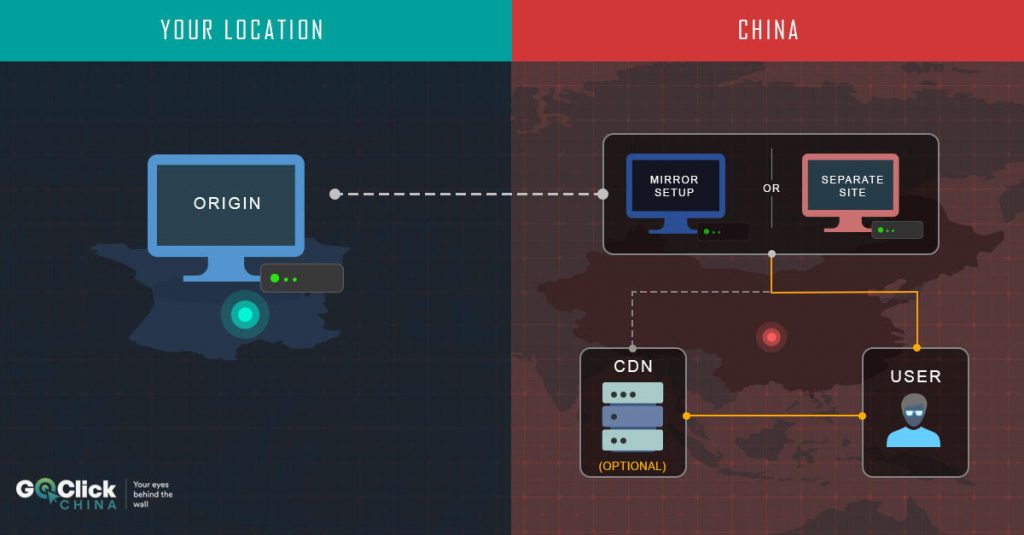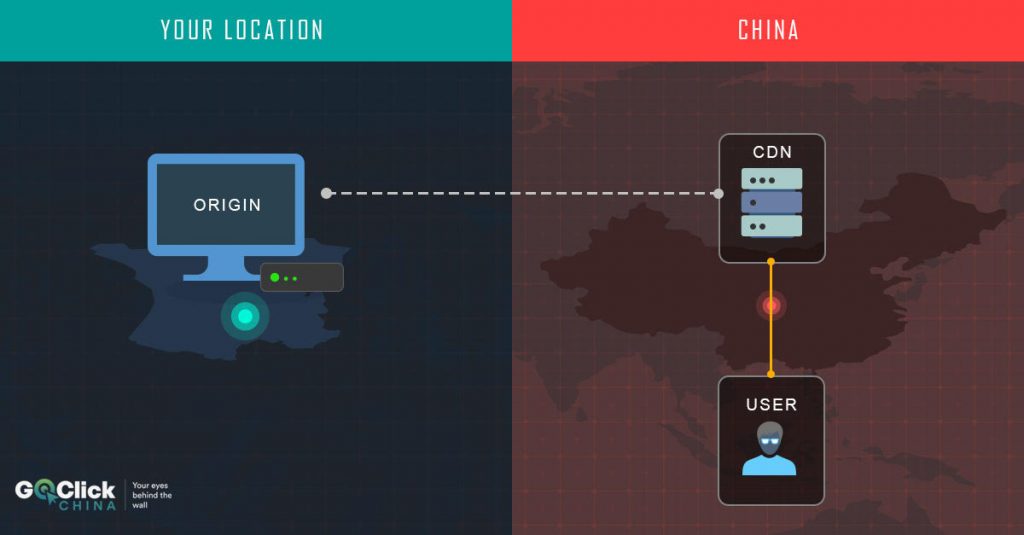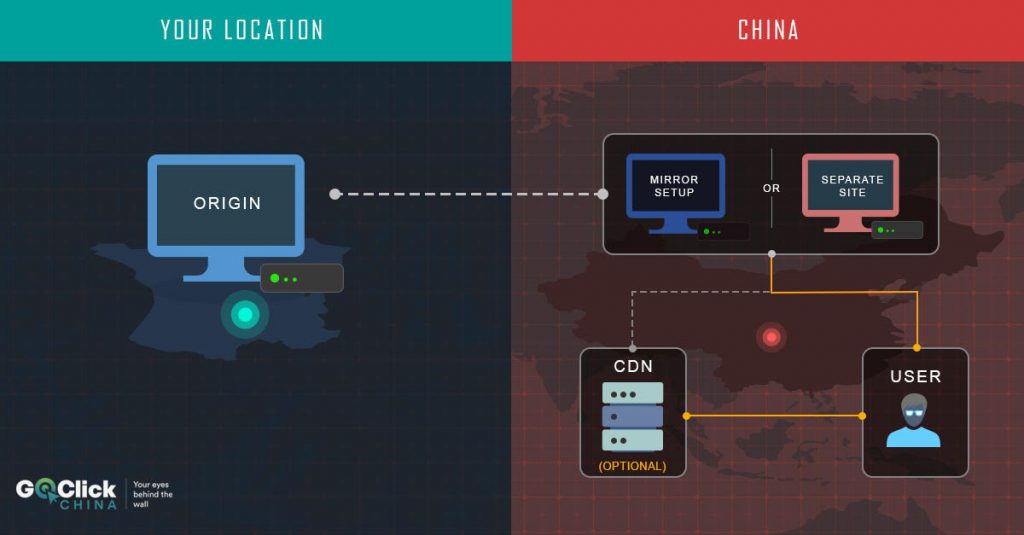Foreign businesses face many unique challenges regarding online infrastructure in China.
If your business chooses to host its services in China, it should know that the country has a complex regulatory environment.
On the other hand, if your business chooses to host its services outside of China, you will have to deal with the Great Firewall (GFW), arguably the biggest barrier to foreign businesses trying to establish an online presence in the country.
The dilemma of which is the best online infrastructure setup for foreign businesses in China has motivated us to write this article, in which we explore the top 3 options available.
However, before entering the topic, you need a clear perspective on the challenges involved, for which it is necessary to briefly talk about what ICP is.
What Is an ICP, and Why Is It Needed?
In China, an Internet Content Provider (ICP) is a company or entity that provides Internet-based services, such as websites, applications, e-commerce platforms, and other content. For this reason, hosting a website or online service in China requires an ICP license.
In other words, having an ICP license ensures that websites hosted in China adhere to the country’s regulations and laws. This helps to increase the trust of the Chinese online community, which benefits businesses looking to engage customers in the Chinese market.
If you're interested in finding out if your business is eligible for an ICP license, we have a full article dedicated to what an ICP license is and why you need one. Said article also covers what are the types of ICP licenses and their differences.
That said, an ICP license also broadens the infrastructure options available to your business in China, a topic we will cover in depth below.
Infrastructure Setup Options
Will you move the hosting and cache of your content to China or keep your current setup and only invest what is necessary to improve latency for Chinese users?
These are the questions your team should consider before entering China. In this section, we'll help you decide what best suits your business needs by reviewing the pros and cons of the available options.
Option 1: ICP-Licensed Domain Hosted Within China.

An ICP-licensed domain hosted within China is a domain that has been registered with the Chinese Ministry of Industry and Information Technology (MIIT). As explained, this type of domain registration is specifically for foreign companies that wish to provide Internet services to Chinese customers and host such services within China.
Among the pros of this setup stands out:
- Greater Flexibility. With an ICP license, you can choose to host a mirror of your current website in mainland China or create a separate website just for the Chinese audience. Your approach will depend on your service requirements and business strategy.
- Utmost Performance. Regardless of the deployment strategy, your online services and content will be closer to your audience, benefiting from low latency and great speed. Moreover, if you add a Chinese-based CDN, such performance will improve even more, putting your content on par with China's best websites and services.
- Less Prone to GFW Blocking. Having a licensed ICP and hosting your content within China guarantees that the GFW will not intentionally block the content. Note, however, that this does not exempt your organization from complying with China's content regulations.
Likewise, we must highlight some cons related to this setup.
- Requires An ICP License. As expected, this setup is only available to companies that are eligible to obtain an ICP license in China. The process to obtain such a license is complex, so your organization must ensure this is the best setup for its use case.
Overall, this setup is ideal for businesses offering services that require minimal latency and high performance. Likewise, this is an ideal option for businesses that want to minimize the risk of being blocked by the GFW and who don't mind applying for an ICP license and hosting their content within China.
Option 2: Adding A China CDN to the Current Hosting Setup.

An interesting alternative for companies that do not wish to alter their infrastructure is to add a China-based Content Delivery Network (CDN) to their current hosting setup. In this way, they can enjoy much of the benefits of option 1 without the additional IT work associated with hosting their servers within China.
Among these benefits are the following:
- Reduces the Risk of Being Blocked by the GFW. Since the content is cached in mainland China, the risk of blocking by the GFW is reduced. Remember, though, that reduced risk is not the same as bypassing the GFW, which is only possible with the above setup.
- Better Performance. With a CDN, users in China can access content with less latency and improved data transfer times. China CDNs also provide better reliability, as they can withstand high traffic volumes and scale to handle sudden increases in demand. By providing better performance and reliability, a China CDN can help improve user experience, reduce latency, and improve website performance. Furthermore, by implementing a multi-CDN setup, your organization could even protect your services from outrages.
Just like before, we must highlight some cons related to this setup.
- Performance Improvements May Vary. You should not lose sight of the fact that in this setup, the origin server is outside of China and that the latency and general performance will be affected by the distance to it. Put another way, the performance gains will be modest if the CDN fetches data from an origin server in the USA compared to one in Europe or Asia.
- Your Company Still Requires an ICP License for This Setup. As before, the prerequisite to setting up a China-based CDN is to become a licensed ICP, which can be a deal breaker for companies that are not eligible for it.
As you can see, this setup demands that you carefully evaluate whether the performance gains are worth it. Simply put, this setup is best for organizations eligible for an ICP license that don't want to make significant changes to their infrastructure but, more importantly, that host their content relatively close to China. This brings us to the third and final setup.
Option 3: Mirror Setup Nearby Mainland China.

From the above setups, it is clear that the distance to the origin server is crucial. That said, it is logical to think that a technically viable alternative is to deploy a server that duplicates the origin server's content (a mirror) near mainland China. Said setup would offer a good alternative to option 2. Furthermore, nothing prevents your business from hosting sensitive data on the mirror server and deploying a CDN in China. This would improve performance even more since the mirror server and the CDN would be close to each other.
Let's review the advantages of this setup.
- Good Performance. Since the mirror content server is closer to the users, both performance and latency are improved. This helps to improve the user experience significantly. Furthermore, this setup can be tuned for China networking, which results in lower latencies and more reliable service. As already mentioned, latency and overall throughput could be further increased with a local CDN.
- ICP License is Optional. Possibly the biggest advantage of this setup is that the ICP license is optional. Such a license will only be required if your company decides to host some of the content on a CDN in mainland China.
Now, let's go over the key disadvantage of this setup.
- GFW Blocking. Even if you hire a local CDN, your IT team will have to deal with GFW content blocking since the mirror server is outside of China.
There is no doubt that this is one of the most interesting setups. It does not provide the best performance or address the issue of GFW, but it still improves the uptime and latency of your online services without needing an ICP license. This makes this setup ideal for companies looking to improve performance without hosting content in China.
Wrapping Up
Throughout this article, we have evaluated three different infrastructure setup options for foreign businesses in China. We have explored an "all within China" option, a "nothing within China" option, and an intermediate option involving infrastructure inside and outside mainland China. All options improve web performance; however, each comes with trade-offs.
What is the best option for your business? The answer will depend largely on your company's goals and the location and characteristics of your current infrastructure.
Fortunately, your business can count on GoClickChina's unrivaled experience to help you determine which scenario is most appropriate for your use case. Our services include a complete check and test for your website, which provides your organization with invaluable insights to find the best solution. To learn more, check out our services.



